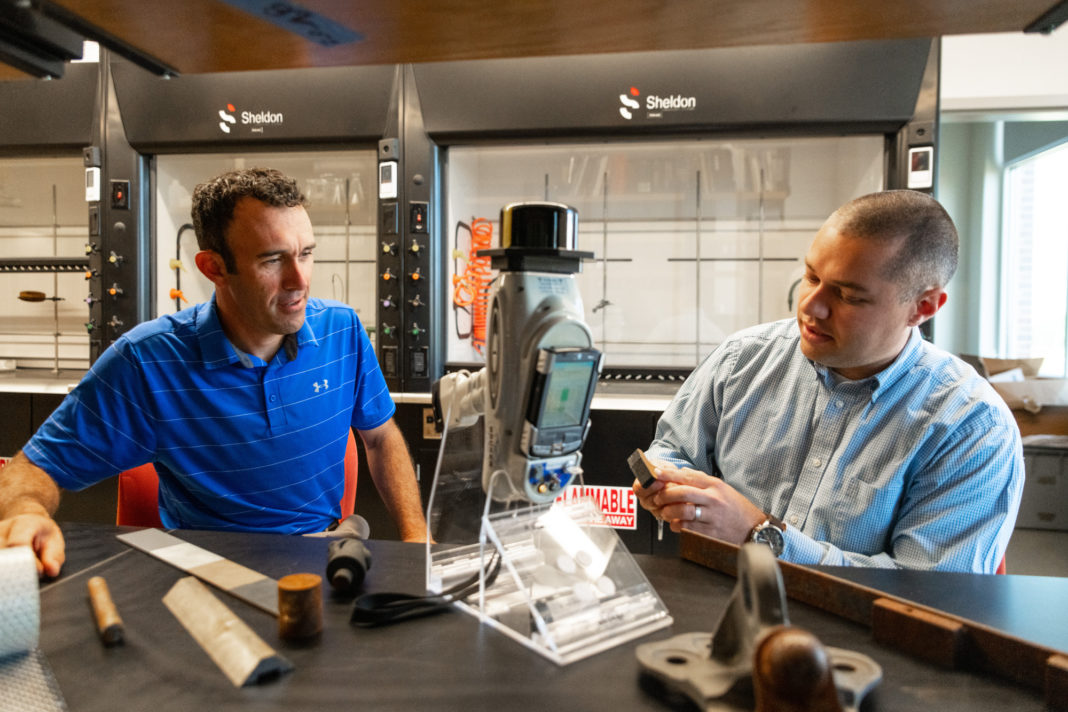MACON – Mercer University chemistry faculty members Dr. Joseph Keene and Dr. Kevin Bucholtz were recently awarded a $344,289 grant through the U.S. Department of Defense’s (DOD) Defense University Research Instrumentation Program (DURIP).
The DOD announced DURIP awards to 150 university researchers totaling $50 million. This year’s grants were provided to 85 institutions in 33 states to support purchases of major research equipment to augment current and develop new capabilities.
Mercer’s grant, awarded by the Office of Naval Research, will provide for the acquisition of state-of-the-art research instrumentation and equipment to expand ongoing work in the Department of Chemistry in collaboration with the Mercer Engineering Research Center (MERC) related to corrosion prevention and control.
Grant funding will be used to purchase a suite of equipment and instrumentation to bridge the gap between fundamental laboratory-based research and field-level implementation to detect, analyze and inform corrosion-related solutions. These tools include handheld instruments, such as Raman and infrared spectrometers, a glossmeter and a colorimeter, as well as a laboratory-based infrared spectrometer with microscope that provides micron-level spatial resolution and equipment for accelerated weathering of samples.

“Corrosion is a surprisingly costly issue that also has direct implications for our national security. The DOD reports spending more than $20 billion annually to prevent and control corrosion,” said Dr. Keene, assistant professor of chemistry. “This DURIP grant provides us with the necessary resources to perform fundamental investigations at the atomic and molecular levels on corrosion-related processes, methods and materials. We are studying corrosion in order to develop solutions at all stages of intervention in the corrosion process: prevention, control and remediation.”
“This grant will expand our capabilities to continue work on corrosion-related projects with the DOD and will make us more competitive in pursuing DOD grants and contracts in the future,” added Dr. Bucholtz, professor of chemistry and director of undergraduate research. “The uniqueness of the corrosion suite of instrumentation funded by this award is that not only will we investigate fundamental corrosion processes on emerging additive manufacturing metal alloy substrates, but we will also develop and deploy non-destructive, field-level, real-world atomic- and molecular-level testing elements.”
Both faculty members have prior experience with surface phenomenon at a variety of interfaces. Dr. Bucholtz is a synthetic organic chemist with research interests in small molecule design for biosensing applications, pathogen detection and small molecule receptor interactions. Dr. Keene’s research has focused on the surface chemistry and photophysics of semiconductor nanocrystal quantum dots. Together, they have a track record of corrosion-related work with the DOD and mentoring undergraduate student researchers at Mercer to address government interests.

In particular, this grant project builds on prior collaborative work with MERC, the U.S. Air Force (USAF) and the Air Force Research Laboratory to investigate new technologies, processes and materials that inhibit and/or control corrosion formation on USAF support equipment and vehicles, as well as aerospace ground equipment. The investigation, findings and recommendations coalesced around technology areas for immediate relief of corrosion maintenance costs and future growth and research.
“The collaborative efforts of MERC and Mercer’s Department of Chemistry are laying the groundwork for a fundamental change in the way we inspect aircraft,” said Andi Mitchell, executive director of MERC. “We have been excited both by the possibilities of the technology and the opportunities for undergraduates to perform highly relevant research that makes a difference. Those graduates will enter the workforce ready to support the needs of industry from day one.”
The highly competitive DURIP award process is administered through a merit competition jointly by the Air Force Office of Scientific Research, Army Research Office and Office of Naval Research. The DOD seeks specific proposals from university investigators conducting foundational science and engineering research relevant to national defense.
“DURIP awards help maintain the cutting-edge capabilities of our universities and provide research infrastructure to enable the most creative scientific minds in the country to extend the boundaries of science and technology,” said Dr. Bindu Nair, director of the Basic Research Office of the Office of the Undersecretary of Defense for Research and Engineering. “The awards will facilitate scientific advances that will drive unparalleled military capabilities for our country and help train our future STEM workforce.”
This year’s competition received 742 proposals requesting $297 million in funding.
“Our selection alongside other esteemed programs reinforces Mercer’s competitiveness with the top research institutions in the nation,” said Dr. Wayne Glasgow, senior vice provost for research at Mercer. “Other universities chosen as recipients of the DURIP award include major research institutions such as Harvard, MIT, Stanford, UC Berkeley and the top 10 Ph.D. programs in chemistry and in engineering. In fact, Dr. Keene and Dr. Bucholtz are the only awardees who mentor only undergraduate students in a department that does not offer master’s or doctoral degrees.”
About the Office of the Under Secretary of Defense for Research and Engineering
The Office of the Under Secretary of Defense for Research and Engineering is responsible for the research, development, and prototyping activities across the Department of Defense. OUSD(R&E) fosters technological dominance across the DOD ensuring the unquestioned superiority of the American joint force. Learn more at www.cto.mil or follow us on Twitter: @DoDCTO.
About the College of Liberal Arts and Sciences
Mercer University’s College of Liberal Arts and Sciences serves as the academic cornerstone of one of America’s oldest and most distinctive institutions of higher learning. The oldest and largest of Mercer’s 12 schools and colleges, it is a diverse and vibrant community, enrolling more than 1,900 students, dedicated to learning and service through the practice of intellectual curiosity, respectful dialog and responsible citizenry. The College of Liberal Arts and Sciences offers majors in more than 30 areas of study, including more than a dozen pre-professional academic tracks, with classes taught by an outstanding faculty of scholars. In 2015, Mercer was awarded a chapter of The Phi Beta Kappa Society, the nation’s most prestigious academic honor society that recognizes exceptional achievement in the arts and sciences. For more information, visit liberalarts.mercer.edu.
About Mercer Engineering Research Center
Mercer Engineering Research Center (MERC) is the applied research arm of Mercer University. Located in Warner Robins, Georgia, MERC was established in 1987 to provide locally available engineering, scientific services and specialized technical skills to primarily support Robins Air Force Base. Today, with more than 270 engineers, scientists and business analysts, MERC provides support to the Department of Defense and industry, both nationally and globally, with Executive Director Andi Mitchell reporting directly to the University Executive Vice President. To learn more, visit www.merc-mercer.org.









